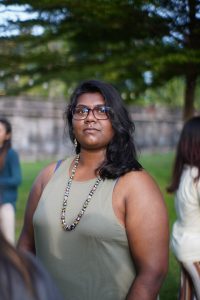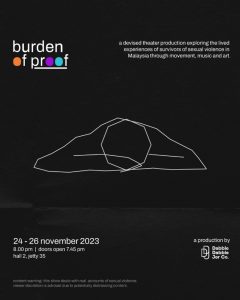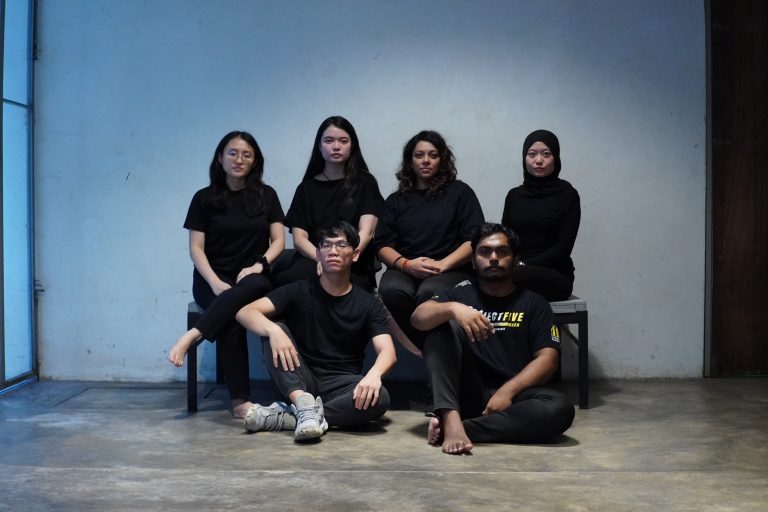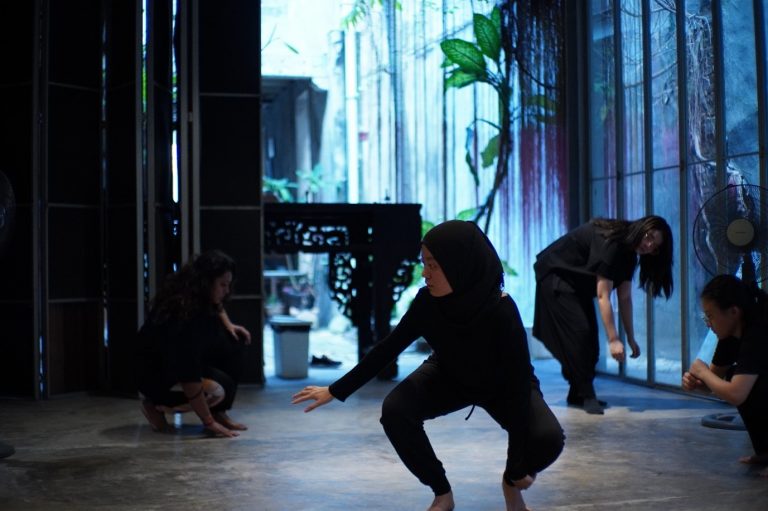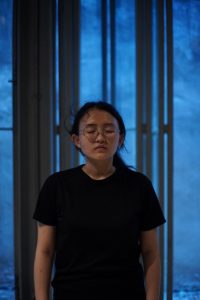For our October feature, we sat down with the members of Dabble Dabble Jer Collective, an arts production team based in Penang, to ask them about their history, their goals, and their upcoming project, Burden of Proof.
By Yee Heng Yeh
For a collective that was only founded in December last year, Dabble Dabble Jer Collective (DDJ.Co) has certainly made its presence felt in the local arts scenes, with recent events including the third iteration of Readings@Tanjong: Negara Kita; and Haid, Jangan Hide, a campaign on period poverty. This November will see the debut of their anchor project, Burden of Proof, described as “an inclusive, multi-disciplinary performance and art installation about sexual violence in Malaysia”.
So how did DDJ.Co first come about? Their profile states that it began “with a shared dream among six friends”—these six are Miriam Devaprasana, Bernardine Abeysekra, Charity Yong, Darynn Wee, Ysabel Loh, and Justin Khaw. Miriam explained that it was Burden of Proof which planted the seed for the collective’s formation, back when she first individually approached the other five to collaborate on this project. “I was like, ‘Hi, I’ve got this crazy idea, I can’t do it by myself, but I know I can trust it in your hands’,” Miriam recalled.
The natural next step was to form a collective. This was partly a practical measure—for one, it made it easier to apply for funding. DDJ.Co also became a platform that afforded them the freedom to create the work they want, without having to come under another organisation. The plan is to eventually expand this, allowing others to join in, too.
What, then, is the sort of work they’re interested in creating? I asked about the themes they’ve listed in their profile: identity, heritage, and sociocultural constructs. It turns out that this direction also emerged partially from the conversations they had surrounding Burden of Proof. “We wanted it to give back to society and actually make change,” said Ysabel. “That’s a very specific guideline that we set for ourselves in the beginning […] which is bound to change and evolve.”
Charity also mentioned “identity” as being particularly significant, since identity, culture, and society all interlink to form the core of the human experience. “There is possibly nothing in our everyday lives that has nothing to do with identity,” she pointed out.
For Justin, it was also a matter of engaging with local culture and histories on a meaningful level, instead of just tucking them away into tidy touristy museums. “I feel like a lot of things are being lost,” he said. “This is a place with actual culture, and people with actual stories to tell.”
The name “Dabble Dabble Jer”, with its distinctive Malaysian rhythm, was inspired by Yasmin Ahmad’s TEDx talk where she referred to herself as a “film dabbler”. This doesn’t mean that the members do not cultivate a deep level of craft in their work, but rather reflects the breadth of their disciplines and fields—theatre, dance, music, language, digital arts, design. “We realised that it was really fun to bring all six different perspectives into one project; why not do that for everything else?” quipped Miriam.
In a collective, it can be a challenge to figure out everyone’s roles and responsibilities, but DDJ.Co was able to look up to existing groups, like Five Arts Centre and MyDance Alliance, who already have certain frameworks in place. Miriam explained that their current rule is, “If you want to do a project, you are the main coordinator.” The rest of the team will still be involved in any major decision-making and also provide on-the-ground support. As she puts it, “It’s incredibly collaborative in that sense; it also doesn’t put the weight on one person.”
If Burden of Proof prompted the establishment of the collective, what then sparked off Burden of Proof itself? Miriam spoke of how she experienced an incident of sexual harassment in public—at that time, she was even involved in a government initiative that propped up women empowerment as its banner. “[But] I walked out of that space going, ‘Actually, I don’t see the state government as an ally for women,’” she said.
This dismaying lack of response made her consider what she could do as an individual, when sexual violence so often goes unchecked and unpunished. “How do other women and men form a collective responsibility towards each other?” Inspired by Jevon Chandra’s Other Things (2022) which she was reviewing, Miriam honed in on the idea of truth-telling as a way to fill that gap. “When victim-survivors tell their truth, what goes on in their mind? Burden of Proof could hold that weight.”
The title itself reflects how victim-survivors are saddled with the onerous ordeal of “proving” the occurrence of sexual violence. “Their whole burden of proof, the whole evidence, is their truth. How do we measure truth?” Miriam pointed out. “So one of the questions is, do you believe them? Do you believe their truth?”
The other members knew that this was an important topic, albeit a tough one. Ysabel, for one, primarily felt a sense of duty. “My friend went through this—I can’t let her go through this alone, especially when she’s brave enough to speak up,” she said. Bernardine added that a project like this “could give voice to the voiceless […] It provides hope to those who feel there is no way they could be heard.”
The journey of developing Burden of Proof has not been easy. Going through the written and verbal accounts of sexual violence, which were collected through an open call, took an emotional toll. Charity, who is reworking some of the stories for the play, stated that, “The perpetrators have no idea what the consequences are 10 years down the road. And now we are here, looking at those consequences.”
They also realised that these accounts came from people they knew, a chilling reflection of that statistical adage that 1 in 3 women experience physical or sexual violence. The sharing of these stories, however, thus becomes a way to create the space and trust to grapple with what has happened. As Miriam described it, “Our friends have come to stand in solidarity with us, but also give us the opportunity to stand in solidarity with them.”
Given the nature of this topic, DDJ.Co has been careful to implement measures to prevent further traumatisation. When asking for stories, they emphasised three tenets: diversity and inclusivity, confidentiality, as well as compassion. In rehearsals, too, they employ a method of disconnecting from the self as a safeguard for the actors. Ysabel spoke of how she would instruct, “In this room, you’re this; outside, you’re yourself again.”
Having to constantly wrestle with such a heavy topic, how do they take care of their own mental health? The members affirmed that the collective nature of the experience is essential, allowing them to understand and support each other. “Everyone in this project is in the same boat emotionally,” Ysabel said. Miriam chimed in, stating how this support is an act of grace. “My friends carve out space for me to spiral, and then pick me up.”
And what do they want people to take away from Burden of Proof? The members hope that it will lead to personal reflection, collective conversations, and tangible measures. “The beautiful thing about Malaysian society is that kita jaga kita—we take care of ourselves—but why is it that in certain spaces we tak jaga kita?” Miriam questioned.
Through the diversity of stories they’ve collected, the objective is also for people to feel heard, empowering them to share their stories. Ysabel expressed that they want to avoid plain old fearmongering. “But stories do stick—we have to be very careful in the way we display them and what we want the audience to think.” On an individual level, Miriam added that it might help people process their own experiences. “Dealing with these stories has been healing for myself as well. Maybe people will find healing through this.”
So, what’s next for DDJ.Co? It sounds like they have an even busier year lined up for 2024, with plans for a music video, original music composition, digital art exhibitions, a film festival, masterclasses, a theatre production, drama therapy, readings, and a project about Penangites who live in heritage residences.
Miriam is also hopeful that Burden of Proof will be a step towards galvanising action in terms of arts policies, even beyond Penang, as well as the publication of a book that would allow these stories to reach different audiences. “We’re hoping that Burden of Proof doesn’t end here, that it goes to wherever it can go, for as far as it can.”
Burden of Proof will feature the eponymous theatre production, alongside:
- screenings of Yih Wen Chen’s documentary film The Boys Club (25 & 26 November)
- The Dabblers Series, featuring a talk with Yih Wen Chen on the process of making her award-winning documentary (25 & 26 November), and another on body and intimacy in the Malaysian performing arts industry (26 November)
- an edition of Readings@Tanjong titled Butterflies and Lotus (25 November)
The programme will run from 24–26 November, which also commemorates the annual international campaign “16 Days of Activism against Gender-Based Violence”.
DDJ.Co is also currently running a crowdfunding campaign for the show. Further updates can be found on their Instagram.
Yee Heng Yeh is a writer and translator. His work is featured on The KITA! Podcast, adda, Strange Horizons, Nutmag, Nashville Review, and Guernica. He is on Twitter @HengYeh42.


